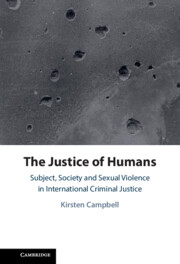Book contents
- The Justice of Humans
- The Justice of Humans
- Copyright page
- Dedication
- Contents
- Figures
- Acknowledgements
- Abbreviations
- Note on Case Citation Abbreviations
- 1 The Justice of Humans?
- Part I Subjectivity and Sociality in Contemporary International Criminal Law
- Part II The Women’s Court and Transformative Gender Justice
- 7 The Women’s Court and the Feminist Approach to Justice
- 8 Building a Feminist Approach to Justice for International Criminal Law
- 9 Building a Feminist Justice Approach to International Criminal Law in Practice
- Bibliography
- Index
8 - Building a Feminist Approach to Justice for International Criminal Law
Political Challenges and Conceptual Foundations
from Part II - The Women’s Court and Transformative Gender Justice
Published online by Cambridge University Press: 08 December 2022
- The Justice of Humans
- The Justice of Humans
- Copyright page
- Dedication
- Contents
- Figures
- Acknowledgements
- Abbreviations
- Note on Case Citation Abbreviations
- 1 The Justice of Humans?
- Part I Subjectivity and Sociality in Contemporary International Criminal Law
- Part II The Women’s Court and Transformative Gender Justice
- 7 The Women’s Court and the Feminist Approach to Justice
- 8 Building a Feminist Approach to Justice for International Criminal Law
- 9 Building a Feminist Justice Approach to International Criminal Law in Practice
- Bibliography
- Index
Summary
This chapter explores whether the feminist form of justice of the Women’s Court provides the basis for developing a more emancipatory model of international justice. It considers how this feminist approach reveals the double bind of the global legal form: that legal justice is necessary but the existing legal order does not provide it. This problem reflects wider feminist and Marxist debates concerning whether law can provide the basis for emancipatory social transformation. The chapter argues for a ‘transitional’ feminist approach to international criminal law, which develops strategies to build alternative feminist forms of international justice and contributes to the struggle to create the conditions for the emergence of new forms of social organisation. It sets out how the feminist form of justice of the Women’s Court provides the basis for developing a feminist approach to international criminal justice. Drawing on feminist legal and political theory, the chapter uses the model of feminist justice to develop new legal concepts of gender-based harms, legal proceedings, subjects, and justice. It shows how these provide four key elements of an alternative conceptual framework for a feminist approach to international criminal law.
Keywords
- Type
- Chapter
- Information
- The Justice of HumansSubject, Society and Sexual Violence in International Criminal Justice, pp. 242 - 287Publisher: Cambridge University PressPrint publication year: 2022

